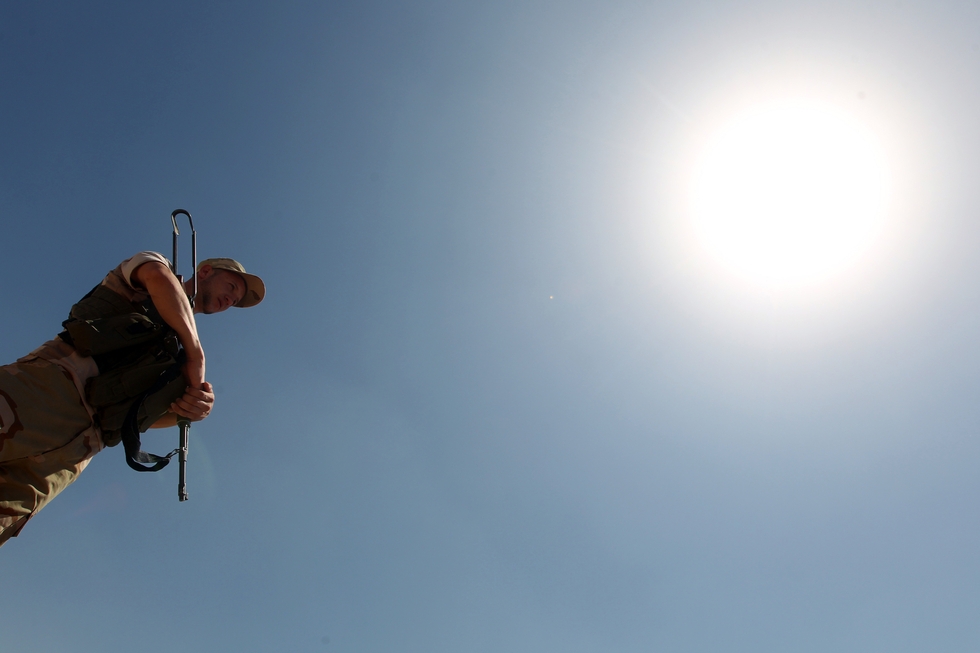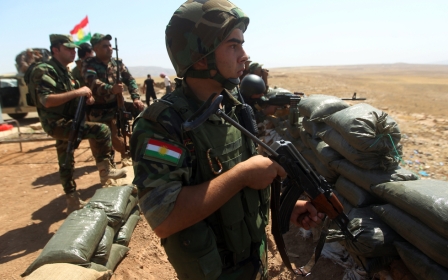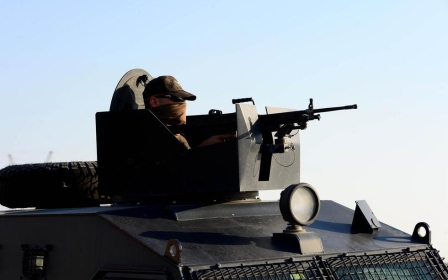What's behind the Iraq-Turkey spat?

The announcement on 3 December that Turkey had sent a detachment of 150 soldiers and seven tanks over 100km south of the border to the town of Bashiqa in Iraq added a new and confusing strand to the tangle of international disputes Turkey is currently involved in.
What was the intention behind sending such a force? Who in Iraq wanted it to come - and, given that there were instant Iraqi protests and claims that Turkey had violated international law, how would the detachment be able to stay there?
Bashiqa (also known as Ba’ashiqa) is a small town about 20km north east of Mosul, the oil-rich Iraqi provincial capital which has been held by Islamic State (IS) militants since June 2014. Its location makes it a suitable staging point for a future operation to drive IS out of Mosul and for that reason a military encampment has come into being there where Turkey seems to have been training soldiers at least since March this year but probably for longer.
As a wealthier, stronger, and more powerful neighbour, Turkey has been drawn ever more directly into northern Iraq in recent decades to the point where the latter has become something close to a satellite state.
As the former imperial power Turkey has close knowledge and links with the tribes and families of Iraq, a structure cross-cutting religious and ethnic groupings which was the basis of Ottoman management of the country but was almost entirely unknown to the Americans during their occupation of the country after 2003.
Turkey has also become the economic powerhouse which has enabled the population of the Kurdish-ruled regions of northern Iraq to enjoy sustained development and prosperity at a level unknown elsewhere in the country. The community of economic interest between Turkey and the Kurds of Erbil has led to a dramatic shift in relations.
For decades, the Iraqi Kurds and the peshmerga were regarded as dangerous adversaries who were anathema to Ankara as it struggled to subdue its own pro-Kurdish movements. About five years ago, that changed totally. The Barzani government has become one of Turkey’s closest and staunchest allies and in November 2013 Massoud Barzani, the Kurdish Regional Government (KRG) leader, even made a joint speech with President Erdogan in the predominantly Kurdish city of Diyarbakir.
Just over two years later Barzani is one of the few Iraqi leaders supporting the presence of Turkish forces at Bashiqa. Kurdish leaders say that Turkish troops helped train their peshmerga forces and make them more effective in the fight against IS.
But it would seem that at Bashiqa, long before the attack on Mosul had even begun, a struggle got under way between the various groups - Kurdish, Sunni, Shia and the Baghdad government - who want to lay claim to it when IS is gone.
Turkey feels that its presence there would be a stabilising factor in an extremely unstable situation, one which the former Turkish consul-general in Mosul, Yilmaz Oztürk, warns could be a worse bloodbath than anything seen so far. Oztürk, now an MP for the centre-left Republican Peoples Party (CHP), was held prisoner along with his colleagues for over three months when IS took Mosul in 2014.
Eyes have now turned to the future of Mosul following the fall of another and smaller city, Sinjar (also known as Shengal) on 13 November to a combination of Kurdish and Yazidi forces supported by US air power.
The future of Mosul, and the stationing of Turkish troops near it, seems to have been among the top subjects discussed by President Barzani during a two-day visit to Ankara that began on 9 December. This visit has to be seen in the context of visits to Saudi Arabia and the Gulf by Barzani just four days earlier: Barzani (reportedly praised by King Salman as a latter-day Saladin) seems to be trying to create a Kurdish-Arab Sunni front in Mosul and its hinterland.
This fits neatly with what is known of the attempted Turkish military build-up in Bashiqa. Turkey’s interlocutor there is actually not Kurdish but a staunch leader of the Iraqi Sunni political movement: Atheel al-Nujaifi, leader of the Hashd al Watani, an Iraqi anti-IS Sunni militia.
A former governor of Nineveh Province, it is Nujaifi who created the encampment and welcomed Turkish participation, believed to be around 600 troops. Atheel’s connections are strong: his family first came to prominence under Ottoman rule and his brother, Usama al-Nujaifi, was speaker of the Iraqi parliament and vice-president until the summer of 2015 when that post was scrapped.
When this apparent alliance is born in mind, Turkey’s insistence on staying in Iraq and the refusal of the Iraqi Prime Minister Haider al-Abadi (a member of Iraq’s Shia community) to agree to any compromise over his country’s sovereignty looks easier to understand.
Relations between Ankara and the Shia-led Iraqi central government in Baghdad have long been very cool because of their respective differing sectarian backgrounds.
In this case tempers on both sides have clearly been lost and misunderstandings grown to an unprecedented degree. Two of Turkey’s most senior officials, Feridun Sinirlioglu, undersecretary at the Foreign Ministry, and Hakan Fidan, the national intelligence chief, travelled to Baghdad on 10 December and returned home after talking with al-Abadi in the belief that they had agreed on a "mechanism" to resolve the dispute. Instead al-Abadi turned immediately to the United Nations, an apparent volte-face which President Erdogan described as "not honest".
However the next day Turkey’s Prime Minister Ahmet Davutoglu indicated willingness for a compromise, declaring that Turkey would "reorganise" its military presence at Bashiqa. His words apparently followed a telephone conversation with the US Vice-President Joe Biden.
By 6 am on Monday morning a limited Turkish troop withdrawal had begun. Diken, a Turkish web newsportal, quoted an unnamed peshmerga commander as saying that it was "being done for show" and that 144 soldiers had gone - which would probably leave the Turkish contingent at Bashiqa at 450. The departing soldiers, the commander expected, would be stationed elsewhere in northern Iraq.
Any plans that did exist to push IS out of Mosul have presumably been badly set back by this dispute, while there is still no agreement between the different groups yearning to make it their own.
- David Barchard has worked in Turkey as a journalist, consultant, and university teacher. He writes regularly on Turkish society, politics, and history, and is currently finishing a book on the Ottoman Empire in the 19th century.
The views expressed in this article belong to the author and do not necessarily reflect the editorial policy of Middle East Eye.
Photo: An Iraqi Kurdish Peshmerga fighter takes position on the front line in Bashiqa, a town 13 kilometres north-east of Mosul on 12 August, 2014 (AFP).
New MEE newsletter: Jerusalem Dispatch
Sign up to get the latest insights and analysis on Israel-Palestine, alongside Turkey Unpacked and other MEE newsletters
Middle East Eye delivers independent and unrivalled coverage and analysis of the Middle East, North Africa and beyond. To learn more about republishing this content and the associated fees, please fill out this form. More about MEE can be found here.





